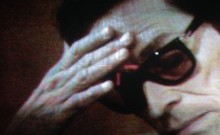Barry Gifford : Beyond Wild At Heart
In Barry Gifford’s world, places have names, & the people who reside between the walls of his cramped rooms, Italian villas, & Southern tracthouses, the horizons of his empty highways, they have them too. They are all worth remembering. Like the late Eugene O’Neill, Gifford was born in a hotel room. Gifford however, unlike O'Neill, appears to have survived, & unlike O'Neill, will not be returned to eternity in the same setting. Rather, his peripatetic, transient nature, fluidly combining elements of pulp narrative, poetry, & melodrama in his myriads of combinations & texts, seems an ordinary companion to this origin. And perhaps just the reason he & his work live on.
Gifford's most recent work appeared in VICE in November, published as a preview of what comes next --- The Up Down, the newest, & perhaps final, installment in the epic Sailor & Lula omnibus --- a sprawling, hobnail driven record of a bloodthirsty romance, & the entangled futures of its progeny & relatives --- spawning one of cinema’s most lurid explorations of romance, Wild at Heart [1990, dir. David Lynch]. His collaboration with Lynch is well-documented & ongoing, leading to the HBO series Hotel Room [1993] & the psychic horror of Lost Highway [1997]. But these are just the beginning. For those willing to delve, my advice would be delve deeply. His other works discussed here include Landscape with Traveler: The Pillow Book of Francis Reeves [1980], Perdita Durango [1997, dir. Alex de la Iglesia, from the novel 59° and Raining: The Story of Perdita Durango, 1992], the excellent City of Ghosts [2002, dir. Matt Dillon], The Cine, a short story, & Do the Blind Dream?, a play based on a series of chapters in the collection of short stories of the same name. The play, following an Italian family of sisters funeral gathering, a reunion based around (& surrounded by) their matriarch’s passing, is a view into the roles, masks, & simple envy of people far away from Gifford’s homeland, but so close to us it may prove too close for comfort. It will receive its premiere this year, as a production of New York’s Black Lodge Theatre Co., to be adapted & directed by Alex Siladi [founder/creative director of Black Lodge].
For his characters, he passes no judgement, even in the most despicable, the most depraved of moments, the most graphic of details. They appear naked, unadorned. Warts & all wouldn’t even tell the half of it. Slowly, his gentle ability to inhabit, with a performer’s fullness of heart, each & every life to be found in his description & telling, overtakes us. It disarms us. It gives pause to the notion that we are in fact --- not there, but here, save for his direction, his words leading us, luring us deeper. In person, his words flying like a rapid relay & succession of electrical signals, he is most at home where he belongs, holding court. Like the good book says, the light has always been “shining in the darkness, and the darkness did not overtake it.”
Mr. Gifford & I met at a cafe in Tribeca. He was in town only for a brief visit --- to read Beyond God & the Devil, a chapter from his upcoming Sailor & Lula novel, at a benefit for Black Lodge Theatre, to be held that evening at Jonas Mekas’ legendary Anthology Film Archives on 2nd & 2nd.

BG Okay, everything okay?
EL Yeah, I was having some trouble with the recorder for a second.
BG I did this a lot back when I was doing journalism back in the day, so I’m used to being embarrassed by the fact that the tape recorder messes up. Anyway, so I’ve a novel coming out, “The Up Down” which is an extension of the Sailor~Lula novels, which are all collected in one book now. And when Alex first had the idea for this, she had the idea of having all different people read from my work. And they had done that in San Francisco, & it was really successful, it really worked.
EL Different stuff?
BG It was their choosing. It was when the omnibus was published a few years ago, when it first came out. So a number of writers from San Francisco, it was two years ago, read their favorite excerpts or whatever it was. Alex had something like that in mind, & I thought yeah we could do that, but at the same time, I think it’s really important to ask someone to do this, & to prepare, & so I just said listen, “You know this thing is coming out in VICE, so why don’t I just read that? VICE is a sponsor of the event & have been very good to me over the last few years, & now they’re such a big deal, it would be like a preview reading of the novel, & it would give me a chance to hear it.
EL So the story is in advance of the novel. When does that come out?
BG The book comes out middle of January.
EL So we get to hear it from you this way? I’ve always thought that helped, especially for dialogue, when the author reads it.
BG We were just talking about Audibles, who do the audio books of my novels. I haven’t read any of them, I only did one, for an earlier book which was Memories from a Sinking Ship, & it’s the best one, because everything’s pronounced correctly. Now the actress who did the Sailor & Lula novels, she was really diligent. She sent me a list of the names she didn’t know the pronunciation for, & I would call her back & leave her messages with me reading the names correctly. But a lot of them, you know, they do them quickly, & don’t get paid a lot, so who knows. You know if I tried to do it, it would cost them about three times what it would cost for say... You to do it...
EL Probably more than three times.
BG ... but my point is, they turn those things out like crazy. So I haven’t heard The Up Down one, but I’ve just heard they’re done with it. They don’t release it till the book comes out. But this should be nice because it’ll be the only time I’ll read it & be recorded for it.
EL I’m wondering about the background of the play, Do the Blind Dream? I read the collection of stories of the same title before reading the text for the play, & was confused as to where one began & the other picked up, because there is a lot about stories themselves that feel very pronounced & theatrical, & I wasn’t sure which was written first.
BG It’s funny you should mention that. Do the Blind Dream? was a short story, & then someone asked me to dramatize it as a film, for some cable thing that never happened, & as I was adapting it, I just had this feeling that this would really serve better as a play. And so then I wrote the play. And I had just done the adaptation of my novel Wyoming (part of another book called The Roy Stories) with the Magic Theatre in San Francisco, & they did that play, it was successful, & I think they also did my Hotel Room plays that Lynch & I did, & that had been done a lot of other places, including Black Lodge. So I gave that to the director of the Magic Theatre, & they’d debuted a lot of Sam Shepard’s stuff —
EL He was playwright in residence there?
BG Yeah it’s the Sam Shepard Theatre there! In any case, they said we can’t do this, it has 14 characters, it has all these speaking parts, it has all these other people, they said we want a play that has 4 or 6, preferably left, Wyoming was a two-hander, the Hotel Room plays have very few characters... And so I just put it away. Then when Alex & I were talking about maybe doing something else I sent her this, & she said “Oh, I want to do it!” I told her about all these parts, all that kind of thing, & she said “No, I’ll figure out a way to do it.” So she was the only person on the face of the earth who showed this type of interest. She’s ambitious (smiling). And I told her, I don’t even know if this is good...
EL I mean...
BG No, wait a minute, I said to her, it’s been years since I’ve even read it.
EL Is it always like that? Do you always lose touch with the piece after writing it?
BG Alex set up a staged reading last year, & I wanted to come cause I was gonna be in New York anyway, & I just wanted to see it, see if we should shitcan it, or see if it worked.
EL Seems like she did a good job, huh?
BG It was a private type of thing & I think there were about 60 people there... I thought there’d be about 14 including the cast... It was a lot of people which I didn’t expect. And the cast was really good. She blocked it out some, & it really seemed to work. And the people there were really happy with it, I mean ecstatic about it, & really encouraging to me to do it, as a play. So I said to Alex, “well, go ahead.”
The Hotel Room plays have been done all over the world, & I think after being spoiled by having David do them for HBO, & him having the advantage of film, to do all kinds of things, & I had stopped going to these productions of my plays, cause some of them were just so terrible. I mean, maybe I have a high standard, I don’t know. Sometimes they’re great, like when the National Theatre in Romania did theirs. But I’d pretty much given up on going.
EL The tone to the stories is extremely theatrical, so the transition seems natural.
BG They’re Italian, how could it not be?
EL You were living there & that informed the writing of it, but you seem to have an innate sense of...
BG ...Behavior? You have to, to see how these families work or don’t work, & that was interesting to me of course.
BG Living with an Italian family, my girlfriend’s Italian, I’m there with her two daughters, 9 brothers & sisters, & witnessing this whole thing, it was like a crisis every 30 seconds. You have to get used to it. It’s not like living with a Norwegian. It can be pretty disconcerting & unsettling, so I had to learn to write in the middle of a maelstrom at all times. But it was often so humorous, along with tragic, & along with all the family secrets, I was in the midst of all of it for 4 years. It was kind of a natural kind of thing & I turned it into this story, & that’s the story behind it.
EL I’m interested in the play because the family is filled with such strong women. It’s something that runs through a lot of your work.
BG The women are always the strongest. And mostly the smartest. Certainly the strongest characters. They seem to have an inner strength, & a different sense of performance.
EL Their struggle is more contained.
BG My own mother was not one of these people, so maybe that’s why I write them this way, maybe that’s why they come out this way. You know, I started out telling stories that were not my own. My first novel Landscape with Traveler has a gay protagonist & at the time it was a thrill, but when it came out they wanted to confuse me for the character. It was actually about a family friend who I knew & wrote about, I knew he wouldn’t write his own story. We’re talking about doing a film right now. Something like My Dinner with Andre, or Shirley Clarke’s film Portrait of Jason, & that’s actually the thing I’m the most excited about, cause I’d love to do that. The main character in Landscape was a close friend of all of us who passed away & I’m sure he’d get a big kick out of it.
EL Where’s your background in theatre?
BG My knowledge of theatre was fairly limited except for when I was 18, & living in London. I became friends with a guy who was a student at RADA. Through him I met people who were there then, such as Hellen Mirren, various others. This was 1965. It was a great time. I began going to the productions they put on, playing guitar for the student revue, the RADA revue. And it was a great time for theatre. You had all the originals — Pinter, Beckett, Olivier was the head of the National Theatre — I’d go to the Old Vic for a dollar & see Olivier do Strindberg or Chekhov for a dollar. I saw John Arden’s Armstrong’s Last Goodnight & remember Albert Finney being hung onstage. And I had never been exposed to this type of theatre before. It’s all narrative. And it’s interesting, even to myself, that after all of this, I never wrote a play. Until the Hotel Room plays, which I was commissioned to do. Mostly if I went to a play & there was an intermission, I’d leave after the first act.
EL I’d be paranoid people would leave.
BG It’s not just the paranoia... It’s the continuity! How do you keep everybody in it?
EL I read this thing you said about making movies, that there’s more possibilities of things that can go wrong than can go right. A number of your films haven’t had the chance to be widely seen, at least not the way they probably deserve to be. Perdita Durango [released straight to video as Dance with the Devil, 1997, w/Rosie Perez & Javier Bardem] & City of Ghosts are two that I love that are frustratingly rare or at least underexposed.
BG What happened with Perdita was a shame... It was supposed to break Javier Bardem out in the States... It sold the whole world, was the most expensive production of a film out of Spain & Mexico at that point...
EL Bardem’s performance is insane in this movie.
BG It gets shown in revivals occasionally. You want to know what happened?
EL Of course.
BG It was a matter of permission for the use of images. Really, Burt Lancaster is what hung it up. Two year earlier, this copyright law had been passed, that said you needed to get permission of living people. So the production left it to the individual countries & territories to pay for it. And I guess the price was pretty high for the Burt Lancaster image, maybe the Gary Cooper one too, & they didn’t want to cut that out of the movie because it was a beautiful moment. And the distributor here didn’t want to have the full freight, so it killed the deal. Those people called me up. They had cut the whole Vera Cruz part, some other stuff, it was terrible. And then they called me up & said, “We think “Perdita Durango” is too Hispanic a title!” I mean, are you serious? I’m not joking. They said they wanted to change it, I said don’t you dare. That’s ridiculous...
EL It’s amazing because it’s a recurring character in the [Sailor & Lula] stories.
BG And they changed it anyway, & cut out all the best parts, & released it on video, & it shows up still, & I tell people not to see that version. However, this movie, both the novel & the film, were wild bestsellers in Mexico, it broke box office records down there, so when I go there, it’s like Queen Elizabeth. Then Javier goes on & becomes a huge star, so it all came true. But in this country, of all countries, that film is not seen. It’s crazy that they didn’t get the permissions, but that’s what happened. And with City of Ghosts, the situation is the same. The problem was the distributor. We thought we’d be fine, because Bingham [Ray, late film producer who passed away at Sundance 2012] was such a good friend & October Films had released Lost Highway. We thought we were good. And then the marketing department tells us they’re going to sell it as an action— not an action film, excuse me — as an art film. Can you believe that? So they put it in the Angelika, for a week, but at the AMC 25, in Times Square, it does terrific business. So that’s what happened. Everything about that movie, the thing I remember is Richard Price went to see it & called me up & told me he loved it. He’s a good friend.

EL It’s nice that there’s this effort on the part of Alex & Black Lodge to have Do the Blind Dream? realized. There’s so much that goes into making these things, & they don’t get made so much of the time, & even when they do, something almost always happens that can potentially derail the whole process. You said Wild at Heart came together fairly quickly?
BG Yeah, Lynch was up shooting the pilot for Twin Peaks, but they didn’t know if that would fly or when that was happening, & he asked if I could write a screenplay for it, & I told him frankly, no. I was about to start writing Perdita Durango, & I told him I could give him something in six months. He said, No, I want to do this now, this summer. So that’s how that went down, next thing you know, we were doing it. All the chips just managed to fall into place.
EL It almost never happens that way.
BG I was in France, doing promotion for the book, which had become a bestseller, before it showed in Cannes, & that gave it a boost there. So for me, I was like Oh! This is what the movie business is like! I was so spoiled. I mean, I had done a little work as
an advisor on scripts for the Gordon Brothers at 20th Century Fox — they went on to make Die Hard, which I had no recommended to them — but I had no real experience with what it felt like to fall in with the right people. You have to have the people who understand what you’re trying to do. A couple of years ago now, I made a film in Romania called The Phantom Father [dir. Lucian Georgescu]. I didn’t write the screenplay, the director did. And then I get a phone call, saying “Would you play this role?” He sends me the pages, I get on the plane, I look at the pages... And I don’t like ‘em. I get there, & we’re shooting the next day. I’m thinking about the scene, & he says, “Let’s have a run through.” And I just made the whole thing up. And I hadn’t spoken to him about this at all. I had been thinking about it the night before, when I went to bed, & I just wanted to try it a completely different way [than was written]. We’re in one room & the director is in the other. Lucian called cut & comes into the room, falls on his knees in front of me & says “Thank you, thank you! I knew you’d do something like this if I brought you here!” It’s a fantastic movie, but it only played in Romania. It lands here only in video oblivion. The list is endless. Another film that no one has seen.
EL It just happens so often. You want it to see the light of day, & then sometimes it works out, sometimes it doesn’t. Sometimes it doesn’t go anywhere, sometimes when it feels like it is going somewhere, still nobody sees it... It’s just so sad when it doesn’t.
BG Yeah but if I wrote a movie called Evan vs. the Intergalactic Gladiators [Ed. Note: fictional title/project, at least as far as we can tell] ... You know? We’d have a better chance.
EL I don’t know if you’d have that much better a chance. I might not be the right guy for the job... You gotta get somebody else I think...
BG But that’s why we want you Evan! You’re exactly the kind of shy & self-effacing, retiring type that’s gonna come across in this... Don’t worry about a thing... And by the way, Julia Roberts is playing your mother...
EL Yeah, & you got a bridge to sell me too huh...
BG I’m not a Hollywood guy. I’m a literary person. They come to me. Matt [Dillon] asked me to write City of Ghosts, he wanted to direct, I’ve known the guy since he was 20. I’ve never gone to anybody. I’ve written a number of other films that weren’t made, none based on my own work.
EL Your experience is fairly limited outside of these specific instances.
BG I’m only interested in working with people who I think can produce something special & I got spoiled in the beginning by working with David, & we’ve done so many projects together now... He insisted I sit next to him all throughout the filming of Lost Highway.
EL Have you ever read the David Foster Wallace piece about his visit to set? [Ed. Note: Wallace wrote a somewhat cynical essay entitled "David Lynch Keeps His Head," included in A Supposedly Fun Thing I'll Never Do Again (1997)]
BG Here’s the only thing I’ll say about that: We were told this guy, Wallace, who I’d never read, never even heard of, would be on set, & that he was going to want to talk to us, interview us for his piece. He supposedly liked Lynch’s films, wanted to talk to him. And we never saw him or talked to him. Later, it came out that he said he was too shy to talk to either of us. There was at least some suggestion about that. He talked to a couple of the people, Balthazar Getty & Natasha Gregson Wagner maybe, & some other people. And I don’t remember so much about it, but something was repeated that he wrote in there which was really scurillous, and it was just so, who the hell is this guy? I mean, why would he repeat gossip? David was furious. But it doesn’t matter. He was genuinely an admirer of our work, but is this supposed to be a smart guy?
EL It’s not so much that, but it does seem like an interesting set, which is why I mention it.
BG We were all there, we were all forthcoming. But in any case, that piece was a sore point. Not for me, it was just silly, but the thing is, I was one of the original Rolling Stone writers, back in 1968, so I thought the piece would be great. I never talked to the guy, never saw him. Some directors want you there, some don’t. David, at the time, & you have to know, I was on the set of Wild at Heart too, as we got to know each other closely, just like this, he’d never allowed a writer on the set before. So we had a sympathetic, symbiotic relationship going on. And Lost Highway was a difficult thing to do, & obviously a lot of people didn’t understand it. We had to come at it from a lot of different angles, & we had to satisfy ourselves that what we were trying to do was, in fact, substantiated by science.
EL I saw that movie when it came out, I was 14.
BG A good age to see it.
EL It was a secret thing, something I had to watch surreptitiously.

BG The best thing I ever heard about it was from the Spanish director Bigas i Luna [Bilbao 1978], who told me “The first 45 minutes of Lost Highway is the scariest thing I’ve ever seen in the cinema!”
EL I remember it being the loudest thing I’d seen up to that point.
BG You wanna hear a loud story? I was with [Italian actress] Laura Morante, we were living in Paris, & it was right at the beginning of our relationship, & she had never seen Lost Highway, & it happened to be playing there. And we went to see it, & it wasn’t loud enough. Now, David has always had this thing where it has to be loud, Loud, LOUDER than LOUD!
EL Is that why it was presented that way?
BG He’s partially deaf. He insisted that this has to be loud, wherever it was seen. And I got used to it. And he was really careful with the design. So I go to the box office & I said, Can you tell them to crank up the sound, it’s not sufficient... And I go back in & sit down with Laura & it goes up a little bit. I said, This isn’t good, & she says to me “Don’t go back & complain again,” so I go up to the projection booth. I knock on the door.
EL This is a scary story for the projectionist... “The writer’s banging on the door!”
BG I went up there & said Man, this is not loud enough! You really gotta crank this motherfucker & maybe even start the film over...” And he looks at me & says, “Who the fuck are you?” I said, Barry Gifford. And he says, “Sailor & Lula?” And he goes & cranks the sound up so loud, I’ve never seen anything like it. Probably drove half the audience out of the theatre.
EL Do you feel like you have that symbiotic relationship like you have with Lynch with anyone in the theatre?
BG Well, when we did Wyoming I worked very closely with the director, Amy Glazer [Seducing Charlie Baker]. I haven’t really had that many experiences. At Steppenwolf we did this play called Nelson Algren Live, [Nelson Algren, writer of The Man with the Golden Arm & Walk on the Wild Side]. John Malkovich was supposed to play Algren, & then suddenly at the last minute one thing led to another as they always do, & he couldn’t participate. Someone suggested I play Algren... And it was really beautiful. The whole thing was really well done, it was a huge success in Chicago....
EL That’s where you’re from too.
BG Originally, yeah.
EL You’ve written about so many films that meant something to you. I was really touched by the story [included in The Roy Stories & Do the Blind Dream? & Other Stories] called The Cine. It’s such a beautiful thing, & it’s so analogous to this experience that I feel like a lot of people who become creative forces in film or theatre or writing have, growing up, that they feel awakened from some dream by how alive the cinema makes them feel, & there’s something in that story that speaks to that.
BG Well I’ve said this in the past: One thing Lynch & I have a common ground in is that we both always saw watching a film as like being in a dream. So that if you enter the theatre, & you surrender like Dorothy, to the images on the screen, let the sounds wash over you — you’re in this dream. It’s different only in that if it’s a bad dream, you can get up & walk out. You’re not sleeping... Well, maybe some people are, no matter what’s on the screen... But you’re entering this dream world, & David said something like that to me one time & I agreed instantly & said “That’s what it’s always been for me!” In the moment.
EL Encapsulated.
BG Completely. It’s why I can never understand watching a film on a cell phone or even really a computer. You can’t have the experience, you don’t have the sound, you don’t have the image, the colors, anything. I don’t know. What does that make us?!
EL The moments when you come out of the theatre & think to yourself What the fuck just happened?, those are the moments that have created so many filmmakers, playwrights, performers...!
BG Okay, but now we’re in a different era. So many of the technological advantages, they make so much sense. It’s all so much easier. Think about editing. I remember we had problems with the master print of Lost Highway when the lab did something. It was scary. We don’t have to worry about that so much anymore, but now, it’s different. You have to worry about different things. David shoots in digital now, he said he’d never go away from film. We were talking about film being like a dream, & I can’t imagine it being any other way — think about how now we have those screens in their homes, they have the ability to have that experience at home — & they still can’t get through the movie without checking their phones. That’s how they like it, with the refrigerator nearby.
EL Right, they can go to the kitchen. In the theatre it doesn’t revolve around you.
BG I think that for the filmmakers who are like me, like Lynch is, you can only hope for the best at this point. You can only hope it will be seen the way it’s supposed to be seen. Let me add that I think there’s very few filmmakers who really demand & deserve this kind of attention to every moment in a film. I really only wanna work with directors who could possibly be doing something unforgettable. It creates a completely different category for me, it’s really kind of wonderful. When Alex [Siladi] first came to me, I liked the things she had to say, the insights she brought to the piece, & when I saw the staged reading, I was convinced she was the right person to do it. That’s why I’m here. And I like working with younger people for the most part, I like people who aren’t afraid of mistakes. It’s not kind of de rigeur. It’s people who are ambitious & in a good way, & are going to bring something fresh to it. I’ve found myself thrust into this elder statesman role & really, I’m excited because I’m interested in what they’re gonna do with my work. I told her I wanted to see the staged reading because, & I told her this, I wanted to see if I wanted anyone to do it. I despise workshops, but I wanted to see if it was good, if it was even a play, you know?
EL That’s role people have to grow into at times — to shepherd the younger generation in a way.
BG I’m just happy people want to visualize & make stories happen out of things that I’ve written. They’re developing The Roy Stories for a cable series, with Walter Salles. And I’m not against any of that. It means you have time. You can do more stories. Look at Lynch: He’s doing Twin Peaks again & it’s 25 years later.
EL: I’m partial to the experience described in The Cine. The way that it becomes about lost time, like Where did I just go for 2 hours? Who are these people around me? Where am I again?
BG: But you can see that as an entire episode. It’s already written, & all you have to do is film it. You know when Salles was doing On the Road, they were using Jack’s Book, my book on Kerouac, as the Bible on their movie, shooting it. We had had that all green lit at Columbia in 95 with Coppola & me & I brought in Gus Van Sant, & it just fell apart. Francis withdrew his whole company [American Zoetrope] And I always tell Francis, “It’s the only disappointment I’ve ever had in the movie business.” And I know Gus was the person for that job, & that was very hard on him too... I didn’t think they had the knowledge necessary to take on this iconic work. There’s so many great screenplays that have never been filmed, who’s to say why? There’s a million reasons why. I think if you put the right people together, you can do it. You know, people don’t go to the movies anymore anyway. All that’s ever playing is Evan vs. the Intergalactic Gladiators...
EL Is that out already?









